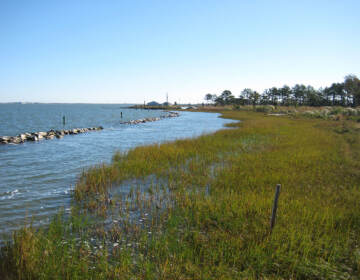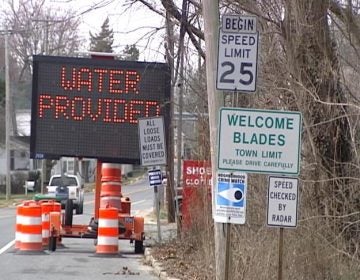Blades residents express health concerns over contaminated water
A fire hall in Blades filled up with at least 100 residents concerned about their health after learning their drinking water is contaminated.
A fire hall in Blades filled up with at least 100 residents concerned about their health after learning their drinking water is contaminated.
The Department of Natural Resources and Environmental Control, Division of Public Health and the Town of Blades held the meeting after the town’s three municipal wells tested positive for perfluorinated compounds above the human health advisory level.
“Who’s going to help us cover the medical costs if we’re not able to work because my son is sick?” said resident Crystal Tickner.
On Friday, Gov. John Carney, D-Delaware, signed an executive order allowing the Delaware National Guard to deliver portable water tanks to Blades so its approximately 1,400 residents and others in the surrounding area have safe drinking water.
A carbon filtration system is expected to arrive Wednesday, and the state hopes the water will be safe to drink in about a week and a half. Residents with private wells can request their systems be tested.
Once the carbon filtration system is operating, the water system will be flushed out and the state will investigate private wells. Once residents have safe drinking water, the state will research potential sources, and take corrective measures.
The state said while the water is not safe to drink, it is safe to use for bathing and doing laundry.
DNREC Secretary Shawn Garvin said the state takes the situation seriously, and its top priority is communicating with the public.
“If I was a resident I would have the same angst and questions everybody in Blades and on private water on the outskirts of Blades have, which is why we’re here to answer as many questions,” he said.
“We took this action in abundance of caution. Although it’s above the EPA health advisory level, public health feels it’s a rather low level, and based on the fact [that the concerns are about] long-term exposure, we don’t think it’s something off the charts. But we reacted immediately because it was a concern and we wanted to address it and get people back to living their lives the way they were a week ago.”
Despite those actions, residents attending the meeting expressed their anxiety about the fact the state does not yet know how long the water has been contaminated.
It was the first time the wells have been tested for this chemical, because it’s currently de-regulated by the U.S.
Similar chemicals also were found at Dover Air Force Base and in New Castle, which now have clean water.
The U.S. Environmental Protection Agency requested sampling in Blades because of the town’s proximity to potential sources of PFCs.
In 2013, the agency tested water in areas close to airports, which use fire suppression foam that contains the chemical.
Ticker said her son and her neighbor’s son have been diagnosed with tumors on their pituitary and kidneys. She’s worried the diagnoses aren’t a coincidence.
“The town of Blades is saying, ‘No, this isn’t contributing, we’re not seeing long-term effects,’ but you haven’t tested before, so how do you know?” Tickner said.
Long-term exposure to perfluorooctanoic acid and perfluoro octane sulfonate can affect pregnant women and infants. It can cause cancer and impact the liver and immune system.
Jamie Mack of the Division of Public Health said while the levels of contamination are above the advisory level, it’s not high enough to be considered a severe health risk.
Most Americans have likely been exposed to the chemical at some point in their life from items like Teflon pans, he said. In addition to keeping food from sticking to cookware, PFCs may also be used to make sofas and carpets stain-resistant, to waterproof clothes and mattresses and package food.
The state also tracks cancer trends in communities, and so far, there’s no evidence to suggest cancers in the area were caused by contaminated water, Mack said.
While the chemical is currently de-regulated, public health experts are continuing to learn more about its potential risks.
“When we talk about chemical exposures we’re always learning more, and it’s not that we don’t know enough, or we aren’t figuring things out, it’s that we have to learn as we go,” Mack said.
“Sometimes as new chemicals are put into production we may not know everything about how they impact the environment or our health, which is why studies like this are continuing so we learn more about it, and that’s why we’re seeing some of the levels across the country come down, and you’re seeing more responses like this where we’re a little more concerned for the health of the folks and as we learn more we’re able to become more productive.”
Others attending the meeting raised concerns that residents outside Blades’ corporate limits weren’t aware they could be affected by the contamination as well, and some scolded the town for being billed for bad water.
Some attendants of the meeting expressed their gratitude for the quick response from the state. A couple other attendants wouldn’t give their names, but told WHYY they believe some residents are overreacting.
However, parents like Sherry Huey say the meeting didn’t dull their anxiety. She said her daughter and some of her classmates have been complaining about stomach pains, headaches and nausea for two years.
“I want to know how long this has been like this,” Huey said. “I want to know what kind of tests my daughter can have to ensure this is not going to affect her in the long-run.”
WHYY is your source for fact-based, in-depth journalism and information. As a nonprofit organization, we rely on financial support from readers like you. Please give today.





